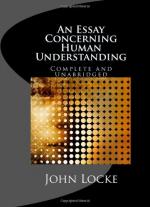
|
Book I
• Understanding separated men from all other creatures.
• Founded in perceptions and ideas, understanding is bound by things that can be perceived and conceived as ideas.
• Locke says that his intention in "Essay Concerning Human Understanding" is to break knowledge into its constituent parts.
• He attacks the notion, from Descartes, that knowledge begins in doubt.
• Locke proposes instead that knowledge comes from sense and reflection on sense experience.
• Locke also argues against the possibility of innate knowledge.
Book II, Chapters 1-15
• Locke says that the mind is a blank slate, without innate knowledge.
• All ideas ultimately come from sensation or reflection, according to Locke.
• Simple ideas come from direct experience--complex ideas result from reflection on simple ideas.
• Complex ideas depend on context and perspective; simple ideas are inextricably part of things.
• Primary qualities do not change depending on perspective or context; secondary qualities change based on perspective...
|
This section contains 449 words (approx. 2 pages at 300 words per page) |

|




